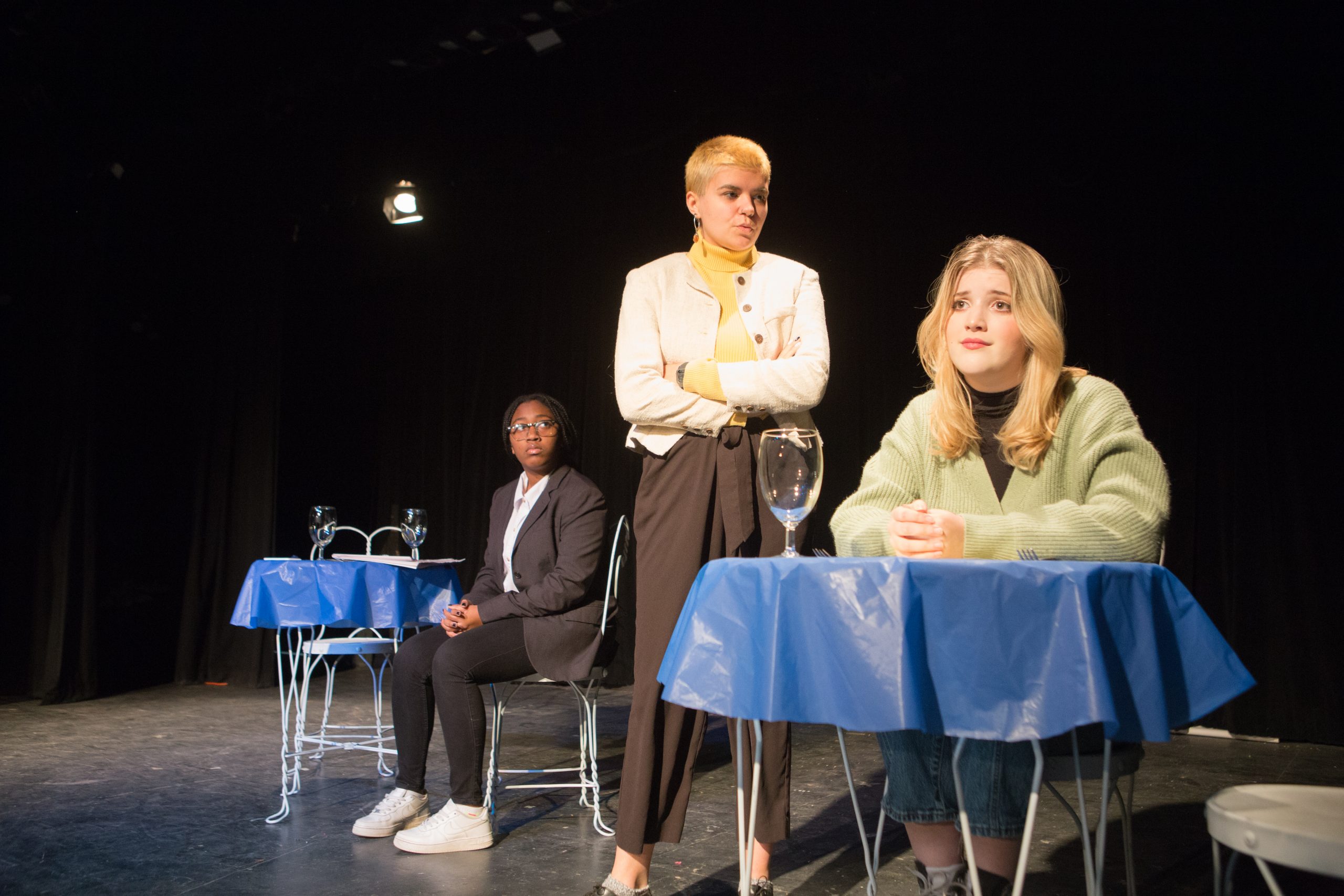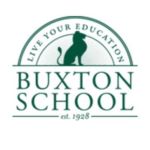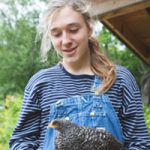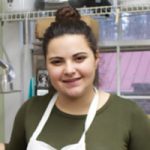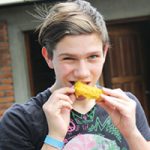Arts
Arts classes, curriculum and instruction at Buxton are unparalleled. Not only does our faculty truly believe in art as the foundation of modern education, but also we are located in the cultural heart of the northeast – with the very top artists in the world as our neighbors, mentors and teachers. Our students follow suit: blowing us away with their talents and capabilities every year. It is a pleasure, a challenge and an unmatched opportunity to explore the arts at Buxton.
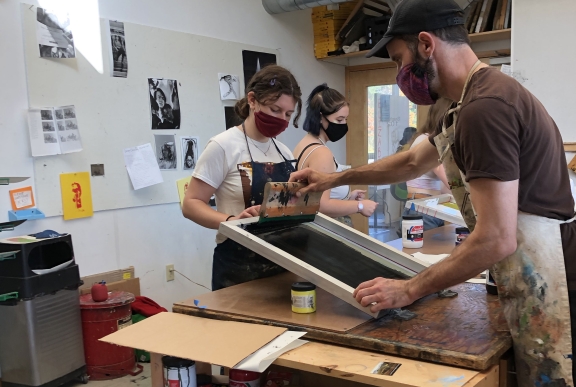
Buxton students can get involved in many different types of arts and in many different ways. There are multiple different kinds of art classes–ranging from photography to drama to everything in between–as well as art activities that practice in the afternoons and evenings. Learn more about what we have to offer:
This is the major production of the winter term and a central component of the All-School Trip. Unlike our other two plays, this one involves every single student in the school. If you are not in the cast (which is usually quite large), you can play in the orchestra that accompanies the production, participate on the lights crew, do make-up, produce the programs, house-manage during performances, or have a hand in any of a number of other necessary tasks. While in our host city, we “give back” by performing the play in nursing homes, schools, retirement communities, or for other groups or organizations that have invited us. The play is usually performed three times in three different venues.
For students who want to learn both the basics of throwing on the potter’s wheel and / or how to hand-build clay works. Classes include slide shows, reading assignments and trips to local galleries and museums to broaden understanding of the past and present states of ceramics as art.
Students who are interested in playing chamber music may participate in one of a number of group ensembles. They vary in size and instrumentation and are individually coached by the music faculty. Duos to seven-piece jazz ensembles form each semester to rehearse and perform student composers’ work as well as standard repertoire. Rudimentary sight-reading ability is necessary. Performances are given several times each year.
Chamber orchestra is open to all students who have an interest in playing music in a larger group. A wide variety of instruments can be accommodated in the chamber orchestra. Repertory works are performed during the Fall and Spring Arts Weekends, and in the winter the orchestra provides music for the touring All-School Play. Recent performances have included Bach’s Orchestra Suites in C and D, Handel’s Water Music, Mozart’s Eine Kleine Nachtmusik, and Schubert’s Rosamunde Overture; waltzes and rags by Scott Joplin; and arrangements of pieces by George Gershwin and Duke Ellington.
Choral activities and vocal ensembles are open to all regardless of prior experience. Twice a year, major choral works are undertaken. An additional piece involving all students and faculty is performed at Graduation. Vivaldi’s Gloria, Mozart’s Missa Brevis K.220 and Requiem K.626, Schubert’s Mass No. 3, Gounod’s Messe Solennelle de Sainte Cécile, and Carl Orff’’s Carmina Burana have been performed in recent years.
A weekly activity, creative writing affords the opportunity to pursue writing projects of choice in an informal, non-academic setting. Students are given the option of sharing their work with the other members of the group and may read before larger audiences of peers, parents, alumni, relatives and visitors at the annual Fall and Spring Arts Weekends. Work is also published in the yearbook and in the Newsletter.
These productions are cast at the beginning of each term and involve students of all grades who wish to be considered for a part. There are no requirements for participation. Casting is at the discretion of the directors, but we strive to involve as many different students as possible. We also take into consideration the needs of the actors. One student might be ready for a challenge, so we will cast them in a difficult role on purpose. Another might be trying out for the first time and we want to celebrate their courage by giving them a small part. These plays rehearse two evenings a week, for two hours each time (though not all students are required to be at every rehearsal for the full two hours). Other students, as volunteers, are in charge of lights, sets, props, and costumes. Some of the work for these crews happens during the evening rehearsals, some happens during Work Program hours. Adults are involved in these crews as well, but students are, and need to be, the primary participants.
This fall the Photography classes are going to concentrate on Analog, 35-mm, black and white “classic” developing and printing photography – learning the techniques if you are new to this and expanding your skills and eye if you are experienced with the basics. In the second semester there will be more classes looking into digital photo, alternative techniques, cyanotypes, etc.
Students who are already familiar with the basics of photo and want to explore digital or other areas as independent projects will be able to do so.
Through exploration in painting, drawing, printmaking, sculpture, fabrics, found objects, and mixed media, students can begin to articulate their artistic visions. Projects are defined through individual discussion. Students are encouraged and introduced to use a broad range of materials. What inspires the student determines which methods of working, materials, and ideas are explored. Throughout, students begin to relate their daily experience to the process of making art.
Students can take structured art classes that offer formal skill sets in drawing, painting and printmaking with an emphasis on balancing direct, observational skills with expressive, independent work. There also is the opportunity to take ‘open studio’ classes where students can work independently on any idea with almost any medium; instruction is available and responsive to individual projects.
Spring term we will be looking at satire and mockumentary as a means of telling stories through video. As a class, we will create videos that aim to honestly capture our lives here at Buxton, and when appropriate, poke fun at the more absurd parts of it. People of all editing levels are encouraged to join; no previous video production is necessary
Offered as either a single- or double-semester course, video production offers students the chance to work hands on with HD, DSLR and DV cameras and Final Cut Pro X software to tell stories via narrative, documentary and experimental filmmaking. Each student maintains a storyboard and video journal and must complete weekly assignments in short documentary and narrative video experiments.
Lessons in piano, voice, and most instruments can be arranged.
Fall & Spring Arts Weekends
Twice a year, Buxton invites families to experience first-hand our esteemed arts programs and the incredible accomplishments of our students. These weekends are special times, filled with displays of studio art, photography and ceramics displays as well as live performances of dance, music and drama.
Weekends also include tours, Q&As and academic panel discussions. All current and prospective parents are welcome to attend.
